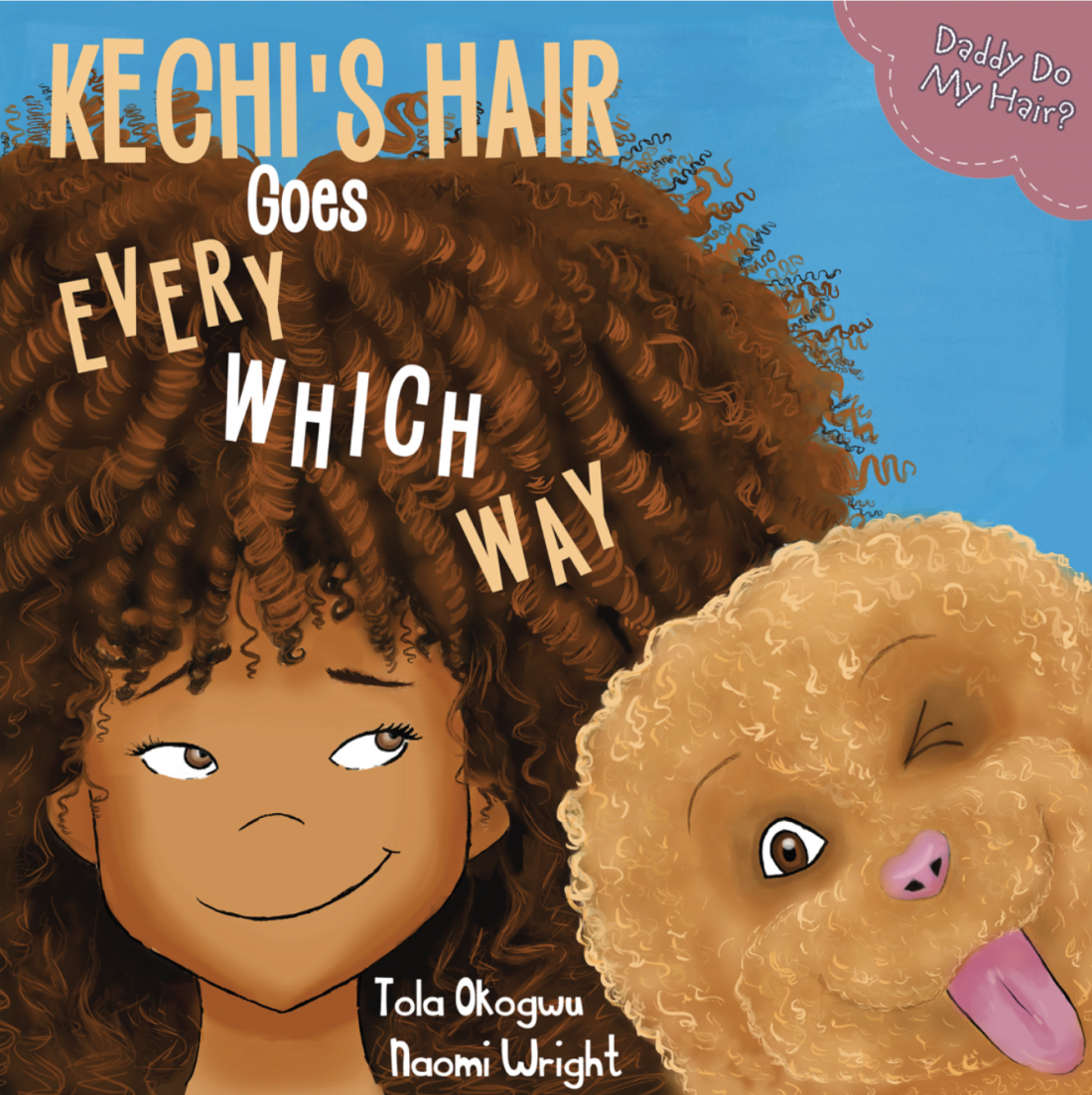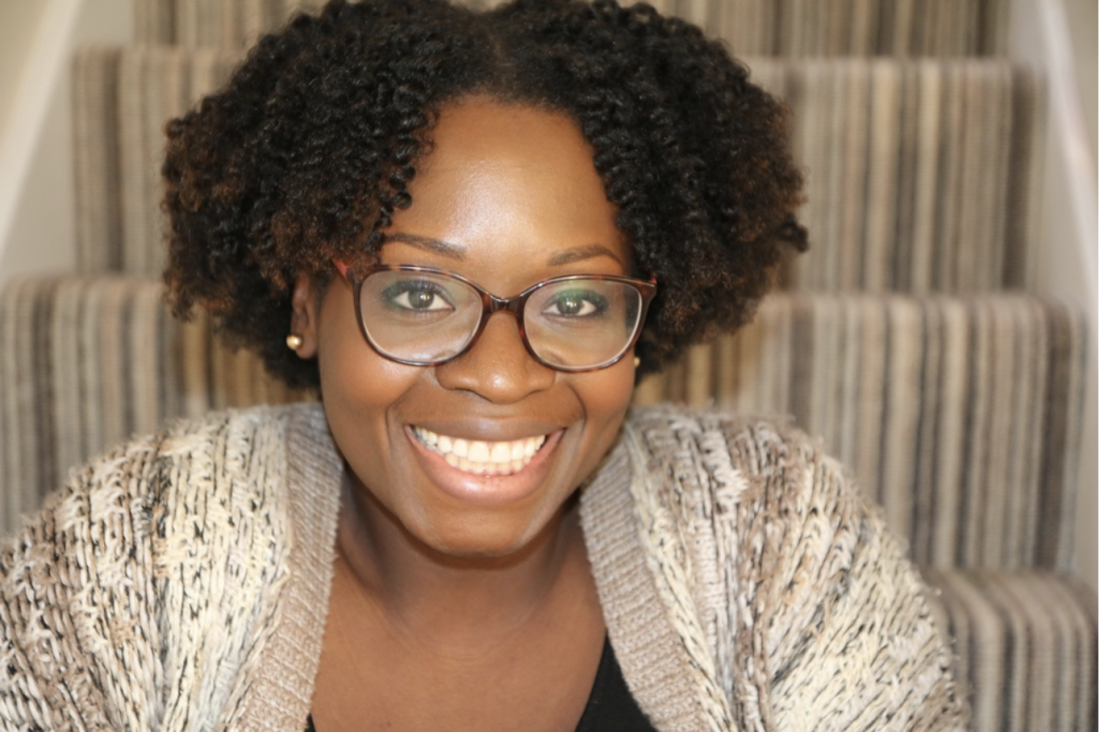What do you do when you struggle through barriers in the mainstream publishing industry? You co-found a publishing firm with your mother of course, and that’s what Tola Okogwu, author of the vibrant children’s book series, Daddy Do My Hair?, did!
The third book in the newly launched Florence Elizabeth Publishing is Kechi’s Hair Goes Every Which Way, due to be released in May 2018. The book tackles the relationship young black girls have with their natural afro hair in an entertaining and educational way.
We caught up with the British-Nigerian author to ask her what inspired her to write, how her writing creates mirrors and windows for this generation of young readers and her experience of the publishing world so far.

MM: When did you start writing children’s books and why?
TO: I’ve been a writer in some shape or form since I was a child. I used to write lots of short stories and I even studied Journalism at university. I also started a blog eight years ago so writing has always been there. I always knew that I wanted to write a book but I was never fully sure what the topic would be. It wasn’t till I had my first child that inspiration struck and I wrote my first book in 2016.
MM: Your topics for children’s books are very relevant and necessary but what pushed you to write and publish the books?
TO: As a mother, it is very important to me that my daughter is able to see herself represented in the toys she plays with, shows she watches and most importantly, the books she reads. But I often struggle to achieve this. The lack of diversity and inclusion in children’s literature is an on-going issue and one that is only beginning to be noticed. After exhausting the few diverse books I was able to find online, I realised that I had an opportunity to be a part of the solution. Publishing books however came about from the sheer fact that it is incredibly difficult to get a publishing deal these days and unless you want your stories to die, self-publishing is the only avenue left to most aspiring writers.
MM: What is your writing process like?
TO: Haphazard at best, much like my life. I’m a mum of two, plus I blog and also work a 9-5 job, so there’s not much time in my day left for writing. I tend to have flashes of inspiration then a mad scramble for a medium to record it down. It’s why I always keep my phone nearby.
MM: Which children’s books have inspired you the most?
TO: I remember the first time I read The Gruffalo by Julia Donaldson. I remember thinking, I wish I’d written it. It is such a complicated tale neatly wrapped in a cover of simplicity and finished with a bow of genius.
MM: What’s the first book that made you cry?
TO: I cried when Aslan died in The Lion, The Witch and the Wardrobe by C.S Lewis. I had fallen so utterly and completely in love with the character that his death was completely unexpected. The book had set him up as the hero of the tale only to kill him off prematurely. As a child, it blew my mind and was probably my first introduction to literary loss.
MM: What was your favourite childhood book?
TO: The Lion The Witch and The Wardrobe again. I was first introduced to it aged nine during story time at school and I was instantly smitten. The idea of a secret and fantastical land where children ruled and had the power to save the world blew my mind. I spent weeks looking through various cupboards trying to find Narnia to my utter disappointment.
MM: How did you come up with the “Daddy Do My Hair?” series?
TO: I came across a powerful illustration online of a black father doing his daughter’s hair. Its impact was heightened because it reminded me of the relationship between my husband and daughter and how passionate he is about playing an active role in her life. Because of my working hours, he takes her to nursery three days a week and so he stepped up and learned to do her hair so that I wouldn’t have to put it into damaging long-term styles.
The moment I saw that illustration, the title ‘Daddy Do My Hair’ popped into my brain. I loved the idea of a book that celebrates a father taking an active part in making his daughter feel loved and beautiful. Something that is sorely missing in much of society these days.
MM: What language devices do you use to empower and inspire your readers and young audiences?
TO: I tend to use rhyme a lot as it comes fairly naturally to me. I come from a musical background and as such I hear sentences in a rhythmic way. As a parent I also lean towards picture books that rhyme as they are so enjoyable to read. Kechi’s Hair Goes Every Which Way is actually my first book written in prose and it was quite difficult, as I kept falling back into rhyme.
MM: You say you want to create mirrors and windows with your writing – what do you mean by that?
TO: Whilst I’d like my books to be read and enjoyed by as diverse a range of people as possible, I’m painfully aware that some people will look at the front cover of my books, see the black characters and immediately decide that it’s not for them. This stereotyping makes me very sad as I believe that it’s important that all children be able to see themselves reflected back in the books they read, hence the mirror.
I also think it’s equally important that children have an opportunity to look into a window and be exposed to different cultures and people. Books can act as both, but for most children they predominantly look into only one.
MM: For other aspiring BME authors, what’s your advice for writing and publishing?
TO: Be ready for rejection, it’s harsh but that is the most basic truth for every author and even more so for writers from a BME background. The next thing is to believe in yourself and your work because you are your own biggest cheerleader. Lastly persevere, don’t let one or even a dozen closed doors stop you.
There are so many new and exciting options available now to get a book published and they make it possible to finally break through the elitist and racist barriers that protect the publishing world. Our stories are important and they need to be heard.
MM: What about little boys? Will they benefit from your series?
TO: Of course, much in the same way the fathers in my books are challenging the stereotypes surrounding parenting and gender, I’d like to think the book is able to cross those same gender lines in its readership. I’d also like to think that boys will benefit from seeing the positive representation of black men and black children in my books. That feeling of being seen and represented is universal. I never had that opportunity growing up.
MM: What do you do to relax?
TO: Funnily enough I like to read and I also watch movies. I’m currently reading Children Of Blood and Bone by Tomi Adeyemi. I can’t even begin to describe how important this book is to the future of how diverse characters are represented in children’s literature.
MM: What’s next for the series and for the future of your writing?
TO: The series is on a hiatus for the present as I plan on focusing on a chapter book I’ve been working on for a while.

Kechi’s Hair Goes Every Which Way will be available from May 2018













1 comment